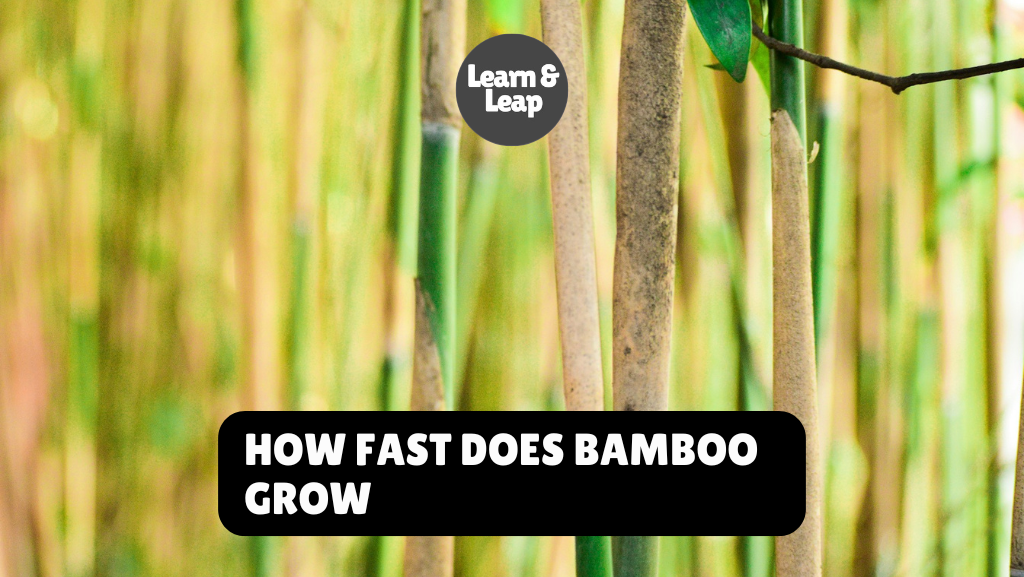
Table of Contents
How Fast Does Bamboo Grow
Bamboo, renowned for its rapid growth, is a fascinating plant that has caught the attention of gardeners, environmentalists, and industries alike. Known as one of the fastest-growing plants on Earth, bamboo offers a range of benefits, from environmental sustainability to commercial applications.
But exactly how fast does bamboo grow, and what factors contribute to its incredible growth speed? Let’s dive into this natural marvel.
Quick Answer For How Fast Does Bamboo Grow?
Bamboo can grow as fast as 35 inches (91 cm) in a single day under ideal conditions, making it one of the fastest-growing plants on Earth. Keep reading to discover more about what influences bamboo’s growth speed and how you can maximize its potential.
The Science Behind Bamboo’s Rapid Growth
Bamboo’s growth is extraordinary due to its rhizome system, which allows it to sprout new shoots at incredible rates. Bamboo doesn’t grow the same way a typical tree or shrub does; it spreads horizontally underground through its rhizomes and sends up new shoots, which grow rapidly to their full height in just a few weeks or months.
Unlike trees that grow by adding rings each year, bamboo shoots grow to their full height in a short period. In fact, many species of bamboo can reach their maximum height in as little as 30-60 days!
This rapid growth has made bamboo a popular choice for everything from reforestation to commercial farming. Its ability to grow quickly and regenerate after being cut makes it an excellent renewable resource.
Key Factors Influencing How Fast Bamboo Grows
Bamboo is a highly adaptive plant, but its growth rate depends on several factors. Let’s explore the primary factors that determine how fast bamboo grows:
1. Species of Bamboo
Not all bamboo species grow at the same rate. The growth speed varies significantly depending on the species. Phyllostachys edulis (Moso Bamboo), one of the largest bamboo species, is known for its incredibly fast growth, often reaching heights of 75 feet or more within a few years. On the other hand, smaller species like Pleioblastus pygmaeus grow much more slowly, typically only a few inches per year.
2. Climate and Environment
Bamboo thrives in warm, tropical, and subtropical climates. In its native regions like Southeast Asia, bamboo grows at its fastest. High humidity, plenty of sunlight, and consistent rainfall all contribute to the plant’s rapid growth.
In temperate or cooler climates, bamboo can still grow, but its growth rate will be much slower. Temperatures below freezing can even damage bamboo and halt its growth.
3. Soil Quality
Bamboo prefers well-drained, loamy soil that is rich in organic matter. Soil that is too sandy or clay-heavy can stunt its growth. Adding compost or mulch can significantly improve bamboo’s growth rate by providing essential nutrients and maintaining moisture in the soil.
4. Water Availability
Bamboo loves water but doesn’t like to be waterlogged. A balance of consistent watering is essential to keep bamboo growing at its peak. In areas where rain is plentiful, bamboo will grow faster, but in drier regions, supplemental watering may be necessary to sustain its growth.
5. Sunlight Exposure
Most bamboo species prefer full sunlight for rapid growth, though some species can tolerate partial shade. Bamboo growing in direct sunlight will reach its maximum potential in height and speed, whereas bamboo planted in the shade may grow more slowly and produce thinner, less robust stalks.
Bamboo Growth by Species: How Different Species Grow at Different Rates
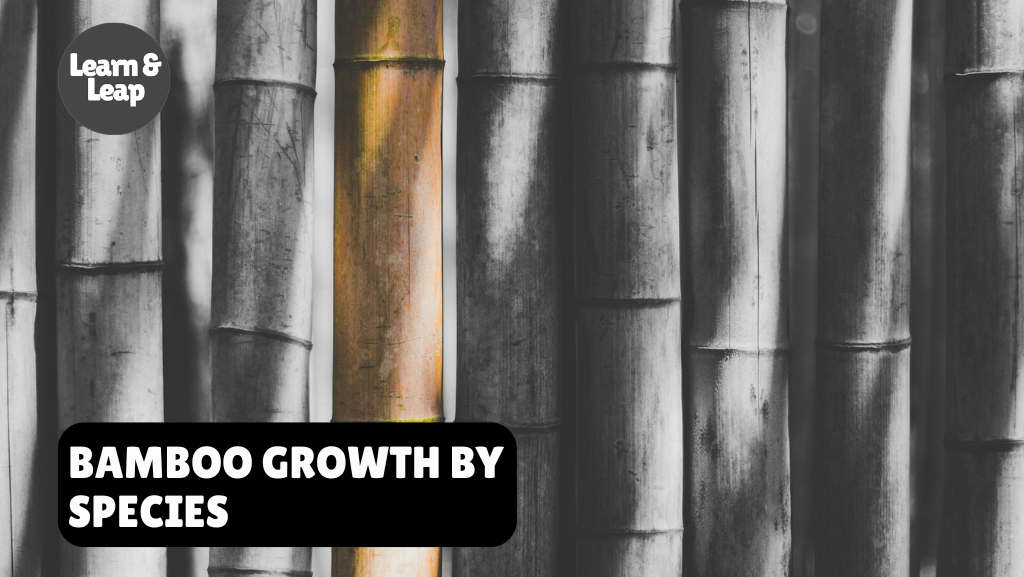
The growth rate of bamboo can vary greatly depending on the species. Here’s a closer look at some of the most popular bamboo species and how fast they grow:
Moso Bamboo (Phyllostachys edulis)
- Growth Rate: Up to 35 inches (91 cm) per day
- Mature Height: 75-100 feet
- Use: Primarily for timber, construction, and textiles.
Moso bamboo is one of the most famous fast-growing species. It’s used in a variety of industries, including the production of bamboo textiles, flooring, and furniture. It’s known for its tall, straight stalks that reach impressive heights in a relatively short time.
Golden Bamboo (Phyllostachys aurea)
- Growth Rate: 10-12 inches per day
- Mature Height: 20-40 feet
- Use: Often used for privacy screens and landscaping.
Golden bamboo is often chosen for gardens and outdoor spaces because of its beautiful golden color and dense, fast-growing nature. It’s a great option for creating natural privacy screens and can thrive in both tropical and temperate climates.
Black Bamboo (Phyllostachys nigra)
- Growth Rate: 2-3 feet per year after establishment
- Mature Height: 20-35 feet
- Use: Ornamental landscaping.
Black Bamboo is slower growing but prized for its striking black stalks. It grows much more slowly than Moso or Golden Bamboo, making it an ideal choice for ornamental purposes rather than for large-scale farming or production.
How Fast Does Bamboo Grow in a Day?
As we’ve already mentioned, bamboo can grow up to 35 inches in a single day under optimal conditions. This rapid daily growth is most commonly observed during shooting season, which typically occurs in spring.
During this season, bamboo plants are focused on vertical growth, with shoots extending rapidly to reach their mature height. Once the plant reaches its full height, the growth rate slows down, and the bamboo focuses on producing branches and leaves.
How Fast Does Bamboo Grow in a Week?
When bamboo is growing at its peak speed, you could potentially see it grow 20 feet in a week. This speed depends on several factors, including species and environmental conditions, but even slower-growing species can grow 1-2 feet per week.
How Fast Does Bamboo Grow in a Year?
After the initial growth phase, bamboo continues to grow more slowly, focusing on thickening its stalks and developing leaves. In general, bamboo can reach mature heights within 3-5 years, with the first few years showing the most rapid vertical growth.
Once bamboo reaches its full height, it may continue to grow thicker culms each year, but the vertical growth will stop.
Can Bamboo Regrow After Being Cut?
Yes, bamboo can regrow after being cut, and cutting bamboo can even stimulate further growth from its underground rhizomes. Bamboo regenerates rapidly, which is why it’s considered a sustainable resource. However, if bamboo is cut too close to the ground, it may take time for the new shoots to emerge.
To keep your bamboo healthy and ensure continuous growth, it’s important to cut it properly. Avoid cutting too close to the base, and give the plant time to recover between harvests.
What Helps Bamboo Grow Faster?
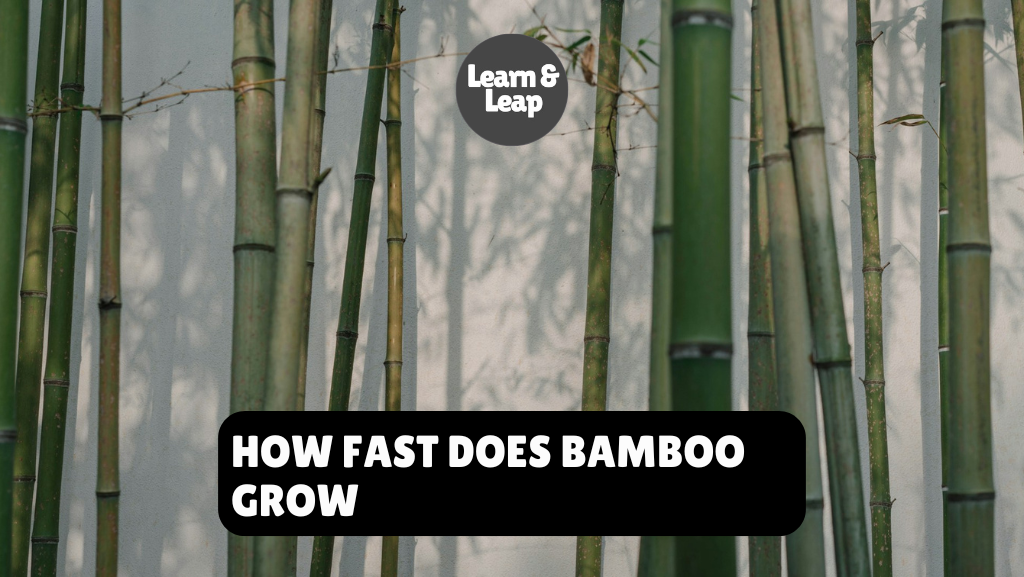
Bamboo is known for its rapid growth, but there are ways to encourage even faster and healthier growth. Here’s a more detailed explanation of how you can maximize bamboo’s growth potential by optimizing its environment and care:
1. Fertilize Regularly
Bamboo thrives when it has access to the right nutrients, particularly nitrogen. Nitrogen is a key component for plant growth, and bamboo benefits from higher levels of this nutrient during its active growing season. Applying a high-nitrogen fertilizer—either a slow-release fertilizer or one specially formulated for bamboo—can make a big difference.
- Why it works: Nitrogen promotes healthy green foliage and helps the bamboo stalks (culms) grow stronger and faster. Without sufficient nitrogen, bamboo may grow weak or become more susceptible to diseases.
- When to apply: Fertilize your bamboo in the early spring, just before the new shoots begin to emerge, and continue fertilizing every few months during the growing season. Be sure to reduce fertilization in the winter when the plant is dormant.
- What to use: Organic compost or a balanced 10-5-5 (Nitrogen-Phosphorus-Potassium) fertilizer works well. You can also use fish emulsion or manure tea as natural nitrogen boosters.
2. Water Consistently
Bamboo requires consistent moisture to grow at its best, especially during its peak growth periods in spring and summer. However, there’s a balance to strike: too much water can lead to root rot, while too little water can cause stress and slow down growth.
- Why it works: Bamboo’s rapid growth relies on steady hydration, but the roots also need access to oxygen, which is why well-drained soil is crucial. Overwatering can suffocate the roots, while drought conditions can stunt growth.
- How to water: Water your bamboo regularly, keeping the soil moist but not waterlogged. Depending on your climate, you may need to water it every 2-3 days during hot, dry periods. Bamboo that receives consistent water grows faster, especially during the shooting season.
- Tips for success: If your bamboo is in containers, be especially mindful of drainage. Ensure that water drains freely from the pot, and avoid leaving the plant sitting in excess water. For bamboo planted in the ground, consider using drip irrigation or soaker hoses to ensure consistent moisture without overwatering.
3. Provide Full Sunlight
Bamboo grows best when it receives ample direct sunlight. While some bamboo species can tolerate partial shade, most varieties, especially those known for their fast growth, thrive in full sun.
- Why it works: Sunlight is essential for photosynthesis, the process by which plants convert light into energy. Full sunlight helps bamboo produce more energy, which translates into faster and healthier growth.
- How much sunlight is needed: For optimal growth, bamboo needs at least 6 hours of direct sunlight daily. Bamboo planted in shaded or partially shaded areas may grow more slowly and produce thinner stalks.
- Sunlight adjustments: If your bamboo is in a partially shaded location and you want to boost growth, consider trimming back any overhanging trees or shrubs to increase sunlight exposure. For bamboo planted indoors or in a greenhouse, place it near windows where it can get plenty of natural light.
4. Use Mulch
Mulching is an excellent way to support bamboo growth. A thick layer of organic mulch (such as wood chips, straw, or leaves) around the base of your bamboo plants helps regulate soil temperature, retain moisture, and improve soil structure as it breaks down.
- Why it works: Mulch helps insulate the soil, keeping it cool during the summer and warm during the winter. This consistent temperature is beneficial for bamboo roots. Additionally, as the mulch decomposes, it releases valuable nutrients into the soil, which can feed your bamboo over time.
- How to apply mulch: Spread a layer of organic mulch around the base of the bamboo, extending out to the root zone (but avoiding direct contact with the stalks). A depth of about 2-4 inches is ideal. Refresh the mulch as it breaks down, especially after the growing season to provide a nutrient-rich layer for the next season.
- Extra benefits: Mulch also suppresses weed growth, which can compete with bamboo for nutrients and water. It improves soil texture and encourages beneficial microorganisms, further promoting healthier bamboo growth.
By following these tips and providing the right balance of nutrients, water, sunlight, and care, you can ensure that your bamboo grows quickly and stays healthy year after year.
Bamboo Uses: Why Its Fast Growth Makes It So Valuable
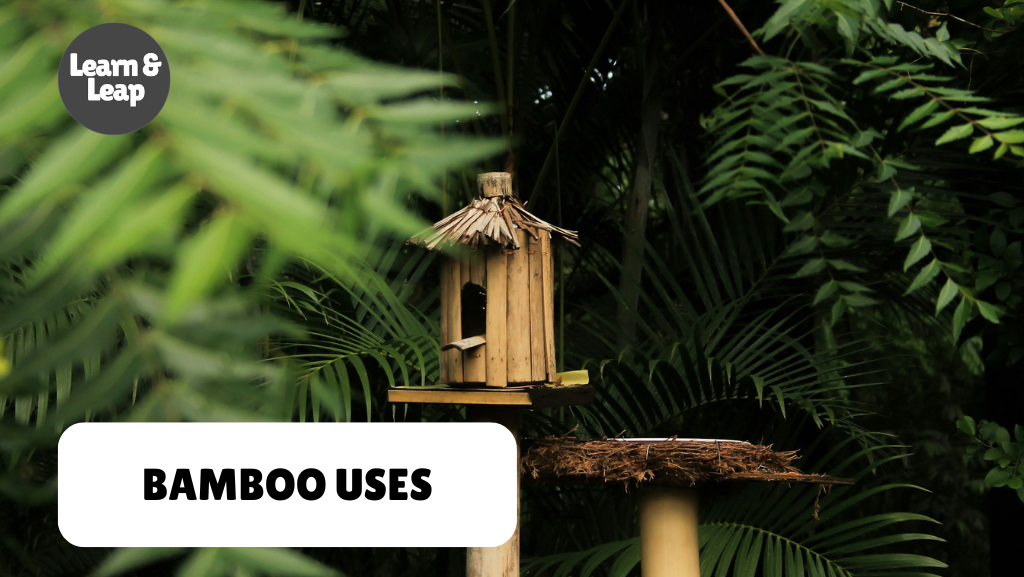
Because of how fast does bamboo grow, bamboo is considered one of the most sustainable materials on Earth. Here are a few ways bamboo is used around the world:
- Construction: Bamboo is used in building materials, scaffolding, and even bridges, especially in parts of Asia.
- Textiles: Bamboo fibers can be spun into soft, breathable fabrics.
- Paper Production: Bamboo pulp is an eco-friendly alternative to traditional wood pulp.
- Landscaping: Bamboo is commonly used for privacy screens, windbreaks, and decorative elements in gardens.
How fast does bamboo grow?
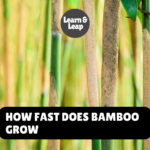
When addressing the question, how fast does bamboo grow, it can grow up to 35 inches per day under ideal conditions. This is mainly seen in species like Moso Bamboo.
How fast does bamboo grow in a day?
To respond to the question of how fast bamboo grows in a day, bamboo can grow as fast as 35 inches daily under optimal conditions, especially during its active spring growth season.
How fast does bamboo tree grow?
Regarding the question, how fast does a bamboo tree grow, bamboo isn’t technically a tree, but its stalks can grow up to 3 feet per day in the right environment.
How fast does black bamboo grow?
In answering the question, how fast does black bamboo grow, this species grows more slowly, usually around 2-3 feet per year after it’s fully established.
How fast does bamboo grow in a week?
To tackle the question, how fast does bamboo grow in a week, bamboo can reach up to 20 feet in a single week during its peak growing season, depending on the species.
Does it take bamboo 5 years to grow?
In response to the question, does it take bamboo 5 years to grow, bamboo doesn’t take 5 years to grow above ground. It typically spends the first few years developing its root system before rapidly growing.
Does bamboo regrow when cut?
When considering the question, does bamboo regrow when cut, yes, bamboo does regenerate after being cut. Trimming bamboo often stimulates new growth from its rhizomes.
What helps bamboo grow faster?
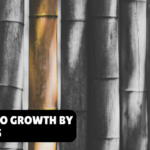
To answer the question, what helps bamboo grow faster, providing regular water, high-nitrogen fertilizer, and ample sunlight can significantly boost bamboo’s growth rate.
Final Thoughts
Bamboo is an incredible plant known for its rapid growth and versatility. With species like Moso Bamboo growing up to 35 inches a day, this is how fast does bamboo grow, it’s one of the fastest-growing plants in the world. By providing the right care—regular watering, high-nitrogen fertilizer, and plenty of sunlight—you can maximize bamboo’s growth potential.
Its regenerative ability after being cut makes bamboo a sustainable and eco-friendly option for landscaping or practical uses like construction. Whether you want a natural privacy screen or a fast-growing plant, bamboo’s quick growth and low maintenance make it a perfect choice for any garden or project.
You May Also Like To Read:
